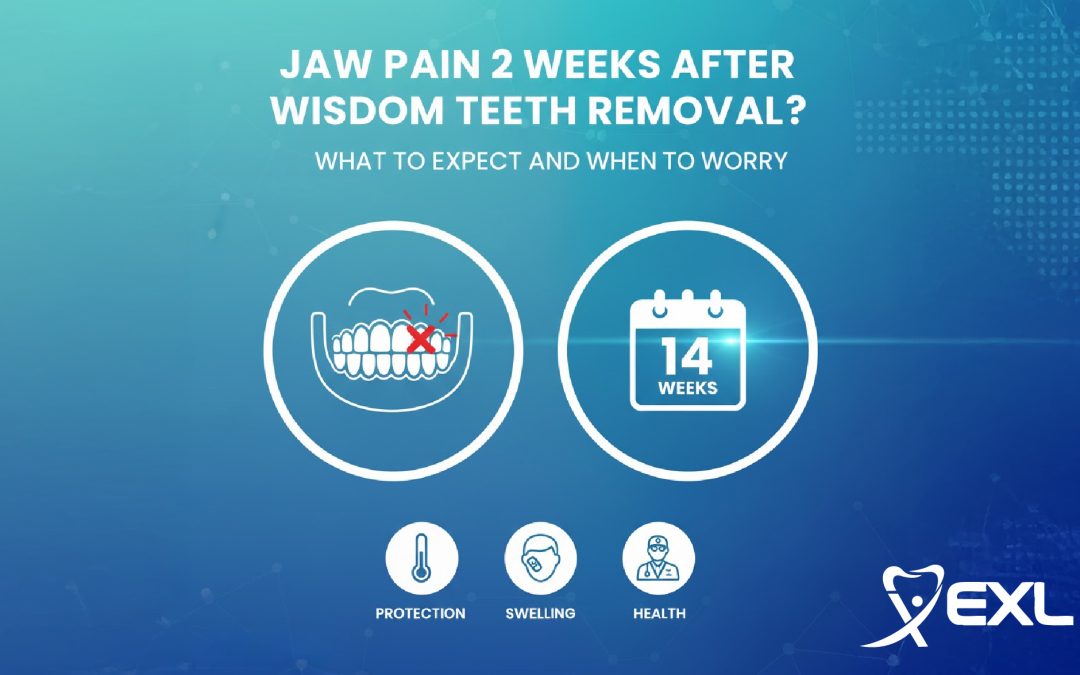
Have you ever wondered, “Is this jaw pain normal?” You’re not alone. Removing wisdom teeth is routine—but if you’re still feeling discomfort two weeks later, it’s natural to worry.
“I’ve seen many patients say, ‘I thought I’d be fine by now,’” says Dr. Priyanka Kumar,
a seasoned Dentist in Gurgaon (DLF Phase 4) with over a dozen years of experience in wisdom tooth extraction and post-op care. She’s treated thousands, including complex cases at EXL Dentist.
Let’s dive into why your jaw might still ache—and when it’s truly time to get checked.
Is It Normal to Have Jaw Pain 2 Weeks After Wisdom Teeth Removal?
Short answer? Sometimes. Mild soreness or tightness in your jaw can linger well into the second week. Think of it like working a new muscle—it might still feel tender when you use it. But if the pain stays sharp, spreads, or interferes with eating…that’s a red flag.
Here’s the thing: gentle discomfort is normal. Worsening pain, however, is your body nudging you to pay attention. And that’s exactly when you want to reach out to a trusted Dental Clinic in Gurgaon (DLF Phase 4) like EXL Dentist.
Causes of Having Jaw Pain 2 Weeks After Wisdom Teeth Removal

Here’s what could be happening:
- Dry Socket – Have you ever pulled a scab off too early? The same principle applies. If the clot protecting the socket comes off, exposed bone can really hurt—and the pain tends to flare suddenly.
- Infection – Even two weeks out, infections can sneak up. Swelling, unpleasant taste, or even fever are signs. These aren’t things you should ignore.
- Jaw Muscle Soreness – Your jaw muscle may be tight from holding your mouth open during surgery. You might feel it more when you yawn or chew.
- Nerve Irritation – Rare, but it happens—especially with lower wisdom tooth removals. If you’re feeling tingling or heaviness around your jaw, that might be nerve-related.
- Extraction Complications – Small bone splinters or sinus involvement (for upper teeth) may be behind the discomfort.
Worried about persistent jaw pain? Book a visit at EXL Dentist, your go-to Dental Clinic in Gurgaon (DLF Phase 4)—let’s get you back to feeling 100%.
How to Manage Pain 2 Weeks After Wisdom Tooth Removal
Here’s something that might help:
Start with pain relief after wisdom teeth removal. Over-the-counter meds like ibuprofen or paracetamol can take the edge off. If you’re still reaching for them after 14 days—time to have a word with your dentist.
A warm compress can feel like a hug for your jaw. Do gentle jaw movements—slowly open and close, or wiggle side to side. It helps loosen things up.
Food matters too. Stick with soft, gentle meals—think yogurt, soups, mashed veggies. Keep things easy. And don’t forget salt-water rinses—they’re like a mini spa treatment for your mouth (just be gentle with the swish).
And while you’re at it—hydration and sleep are your best friends during recovery.
When to Contact Your Dentist
If you’re experiencing:
- Sharp pain that radiates to your ear or neck
- Swelling that won’t quit (or comes back after easing)
- A funky taste or discharge from the socket
- Fever or chills
- Trouble opening your mouth (that’s called trismus)
…don’t wait. These are signs to call your Dentist in Gurgaon (DLF Phase 4) right away. At EXL Dentist, they can quickly check for treatment for wisdom tooth complications and get you on the right track.
If your jaw still aches or feels odd, reach out to our expert Dentist in Gurgaon (DLF Phase 4) today for personalized advice.
Treatments for Persistent Jaw Pain After Wisdom Tooth Removal
Here’s what your dentist might do:
- For dry socket: clean the area and apply medicated dressings—think of it as wound care that actually works.
- If infection’s the culprit: antibiotics and antiseptic mouthwash can help clear it up.
- Bone spurs? They’ll remove any lingering fragments that could be irritating the site.
- Nerve-related pain? You may get referred to an oral surgeon—but it’s rare.
EXL Dentist combines high-tech imaging and compassionate care to handle these issues quickly—so you’ll heal faster and feel better sooner.
Conclusion
Jaw pain after two weeks can be totally normal—like a sore muscle after working out. But when it’s sharp, persistent, or affecting your daily life…that’s your cue to act. Whether it’s dry socket, an infection, or just jaw stiffness, EXL Dentist—your trusted Dental Clinic in Gurgaon (DLF Phase 4)—is ready to help.
Don’t let discomfort linger. Get checked, get treated, and get back to feeling like yourself again.
FAQ
What does an infection after wisdom tooth removal feel like?
It often feels like pulsing pain, swelling, a bad taste, or pus near the site.
How long should jaw pain last after wisdom tooth removal?
Most pain eases between 7–14 days. If you’re still hurting after that, let a dentist check it.
Can you get an infection 2 weeks after tooth extraction?
Absolutely. If things didn’t heal perfectly or bacteria got in—it’s still possible.
How long does it take for jaw pain to go away after tooth extraction?
Normally, within two weeks. Lingering pain deserves attention—just in case.
Are there any side effects of tooth extraction?
Yes—common ones include swelling, dry socket, infection, tightness, or mild nerve numbness.
Nothing seems to help? EXL Dentist has you covered. Schedule your follow-up now and let’s sort it out together.
Reference Links
- American Association of Oral and Maxillofacial Surgeons – Dry Socket
- Mayo Clinic – Tooth Extraction Recovery

